Samuel Chapman Armstrong of the Hampton Institute writes to Richard Henry Pratt discussing some student affairs at Hampton. The letter is partially dated, so the year is uncertain, but likely dates from the period when Pratt worked alongside Armstrong at Hampton.
Pratt, Richard Henry
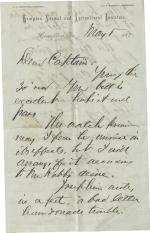
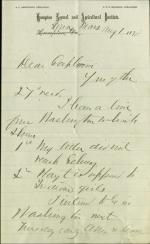
Samuel Chapman Armstrong informs Richard Henry Pratt that he has received a telegram from Washington, indicating that a previously sent letter was not received and that Commissioner of Indian Affairs Ezra Hayt is opposed to educating Indian girls. Armstrong notes that he will go to Washington to discuss the matter in person.
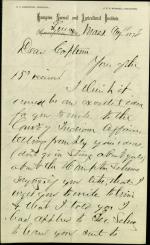
Samuel Chapman Armstrong writes to Richard Henry Pratt encouraging him to write to Commissioner of Indian Affairs Ezra Hayt to share Pratt's ideas about an Indian school. Armstrong provides some advice to Pratt about downplaying Pratt's views about Indian girls' education, how to find political allies in Washington, and how to play towards Hayt…
![Armstrong Informs Pratt That Recruitment Can Begin [Version 1] Armstrong Informs Pratt That Recruitment Can Begin, 1878 [Version 1]](/sites/default/files/styles/views_taxonomy/public/image-document/YALE_WA-MSS-S-1174_b01_f011_7_1.jpeg?itok=83Ev-tG0)
Samuel Chapman Armstrong writes to Richard Henry Pratt informing him that Commissioner of Indian Affairs Ezra Hayt has approved Pratt's idea to recruit Indian youth to attend the Hampton Institute. Armstrong discusses the construction of a new building to house them, and asks Pratt to have photographs taken of the party for promotional purposes…
![Armstrong Informs Pratt That Recruitment Can Begin [Version 2] Armstrong Informs Pratt That Recruitment Can Begin, 1878 [Version 2]](/sites/default/files/styles/views_taxonomy/public/image-document/YALE_WA-MSS-S-1174_b01_f011_8.jpeg?itok=U2czM5aB)
Samuel Chapman Armstrong writes to Richard Henry Pratt informing him that Commissioner of Indian Affairs Ezra Hayt has approved Pratt's idea to recruit Indian youth to attend the Hampton Institute. Armstrong discusses the construction of a new building to house them, and asks Pratt to have photographs taken of the party for promotional purposes…
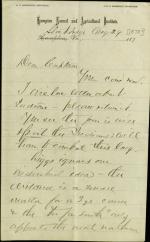
Samuel Chapman Armstrong writes to Richard Henry Pratt enclosing a letter of concerns, potentially from Diggs, about Indian education. The enclosure is not included in this file, but Armstrong outlines some of the concerns, including that "we'll spoil the Indians" as well as opposition to industrial training and the southern location of Hampton…
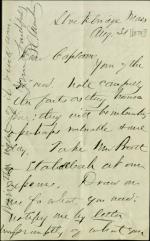
Samuel Chapman Armstrong writes to Richard Henry Pratt authorizing travel expenses for Mrs. Pratt and Etadleuh to recruit Indian youth for Hampton alongside Pratt. Armstrong also discusses some opposition that he and Pratt will face in their work.

Samuel Chapman Armstrong of the Hampton Institute sends Richard Henry Pratt encouragement ahead of a recruitment trip to the West, and suggests using photographs from Hampton to help in his efforts.
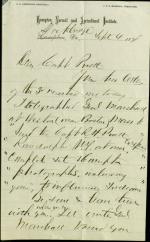
Samuel Chapman Armstrong writes to Richard Henry Pratt informing him that he telegraphed instructions for Pratt to be sent a complete set of Hampton Institute photograph to be used in his recruitment efforts. At this time, Pratt was preparing or had already left on a recruitment trip. Armstrong also notes that he sent a photograph to Spotted…
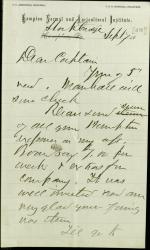
Samuel Chapman Armstrong of the Hampton Institute sends Richard Henry Pratt information on expenses for his recruitment trip in the West. Armstrong also notes that he cannot visit Carlisle yet, but will plan to do so.
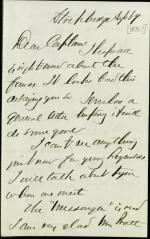
Samuel Chapman Armstrong of the Hampton Institute writes to Richard Henry Pratt discussing school management elements including the "bodily welfare" of Indians.
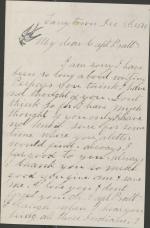
Paul Tsait-Kopeta writes to Richard Henry Pratt providing him with life updates.
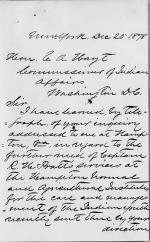
Hampton Institute Principal Samuel Chapman Armstrong responds to Commissioner of Indian Affairs E. A. Hayt's inquiry regarding the need for Captain Richard Henry Pratt to stay at Hampton to help care for and manage the Indian students. Armstrong states that it would be best for the Indians and Hampton for Pratt to remain at the school.
…
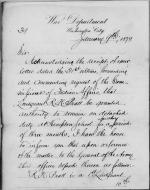
Secretary of War George W. McCrary forwards and endorses a letter from the General of the Army in response to a request to grant Richard Henry Pratt the authority to remain at the Hampton Institute for three months. The note states that Pratt is supposed to be a cavalry officer in Texas, where he is needed, but has been absent for four or five…
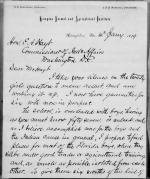
Richard H. Pratt states that he currently has 57 male students at Hampton and is looking to recruit 20 female students. He goes on to say that he plans to send most of the former Ft. Marion prisoners currently enrolled at Hamtpon on outings, believing that placing Indian students in white families where they will learn a trade will help give…
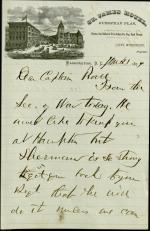
Samuel Chapman Armstrong of the Hampton Institute writes to Richard Henry Pratt informing him that the Secretary of War wishes to keep Pratt at Hampton, while General Sherman wishes to have him transferred back to regular army service. Armstrong discusses the possibility of the Army Bill being used to create an office of Indian education in the…
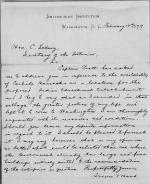
Spencer Fullteron Baird, Secretary of the Smithsonian Institution, writes to Secretary of the Interior Carl Schurz to endorse Captain Richard H. Pratt's request to establish an Indian School at the Carlisle Barracks. Baird contends that there is "no better spot" to open an Indian School because the buildings at the barracks would be well-suited…
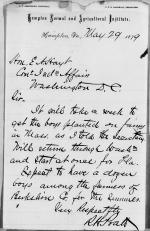
Richard H. Pratt informs Commissioner of Indian Affairs E. A. Hayt that it will take a week to place the male students from Hampton on farms in Massachusetts and then he will travel to Florida. Pratt expects to place a dozen male students on farms in Berkshire County as well.
Note: This item was copied from U.S. National Archives…
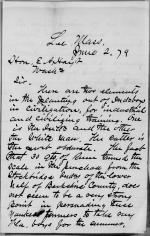
Richard H. Pratt informs Commissioner of Indian Affairs E. A. Hayt that there are problems "persuading these Yankee farmers" in Massachusetts to be outing hosts for Hampton students. While seven farmers are interested in hosting a student, Pratt would like fifteen more.
Note: This item was copied from U.S. National Archives microfilm…
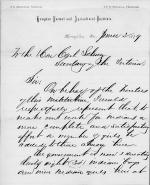
Hampton Institute Principal Samuel C. Armstrong states that they are currently educating 38 Indian boys and only 9 Indian girls, so he requests that they recruit 20 Dakota female Indian students. He requests that, if his wish is granted, Captain Richard H. Pratt be sent to secure the students and that he be allowed to bring back no more than…
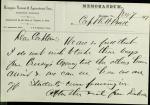
Samuel Chapman Armstrong of the Hampton Institute writes Richard Henry Pratt a memo stating that he cannot take some of the male students Pratt is recruiting at the moment due to capacity concerns.
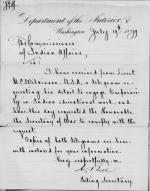
Lieutenant Melville C. Wilkinson requests to temporarily engage in "Indian educational work" in Oregon, and Acting Secretary of the Interior A. Bell forwards and endorses Wilkinson's request to the Commissioner of Indian Affairs and the Secretary of War. In his telegraph to the Secretary of War, Bell states that Wilkinson's work will be similar…
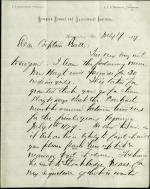
Samuel Chapman Armstrong of the Hampton Institute writes to Richard Henry Pratt informing him that Commissioner of Indian Affairs Hayt has promised a contract to recruit 20 Indian girls for the Hampton Institute. Armstrong discusses a desire to push Hayt for a larger contract for a higher recruitment number, and discusses logistics for Pratt's…
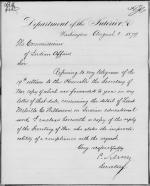
Secretary of War George W. McCrary informs Assistant Secretary of the Interior A. Bell that he does not have authority to allow Lieutenant Melville C. Wilkinson to engage in Indian education as Richard Henry Pratt is already in that line of work. Instead, Wilkinson will be sent to a college in Oregon where certain Indian youth can be sent.…
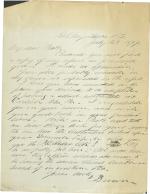
Brown writes to Richard Henry Pratt sending a report and congratulating him on getting permission to establish the Carlisle Indian Industrial School.
